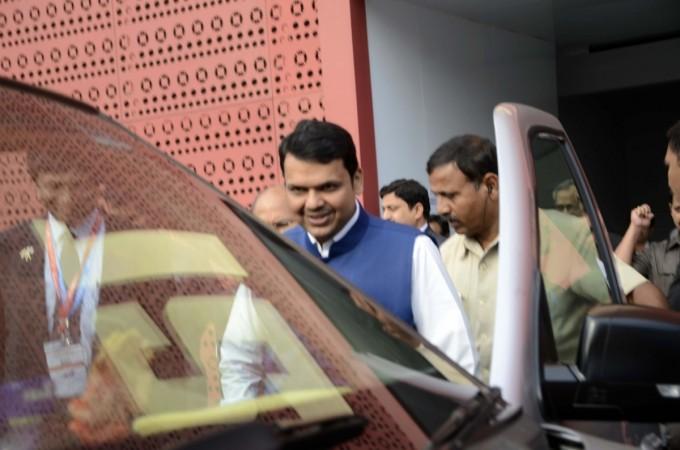
When the BJP's champion duo of Atal Behari Vajpayee and Lal Krishna Advani were nearing the fag end of their illustrious careers, a question often did the rounds: After them, who? The issue of succession in the BJP was something India had not seen since the death of Jawaharlal Nehru in 1964.
It is not that the BJP had no next-generation leaders to take over the reins. The likes of Arun Jaitley, Sushma Swaraj, Uma Bharti, Pramod Mahajan and others were counted among those who would take the tradition ahead. While these leaders were more of the BJP's faces at the Centre, chief ministers like Narendra Modi, Shivraj Singh Chouhan, Raman Singh and Manohar Parrikar were seen as the saffron party's faces in electoral and administrative politics [Swaraj was also the chief minister of Delhi but for a short time].
Yet, it was told that there were too many incompatible opinions in the BJP and things looked scary once Vajpayee retired from active politics after the loss in the 2004 general elections and Mahajan, the country's biggest manager at that time, met a fatal end in 2006.
Advani, who was trying to emerge as the next Vajpayee, drew wrath of the RSS by praising Mohammad Ali Jinnah in Pakistan meanwhile and the BJP stood a divided house and eventually bit the dust once again in the 2009 Lok Sabha elections. It was the waterloo of Advani, who was heading the BJP, and with the party president's chair turning into a musical one, it seemed the BJP was heading to its third straight defeat in 2014 despite the ruling UPA facing serious backlashes.
The first succession question in BJP was solved by Modi's meteoric rise
But it was Modi who changed the game from thereon and starting from mid 2012 and bolstered by his victory in the Gujarat elections that year, the leader rose meteorically to become the prime minister of India and also settle the worrying question of succession. Now, the question could be: Who after Modi?
Though Modi is just three years old as the PM and looks set to dominate a virtually Opposition-less political space in India for may be another decade, yet the common BJP supporter will feel a discomfort thinking about the future and that despite the fact that the BJP has been winning one after another state in the recent past.
BJP state governments have failed to impress
The reason for this concern is the failure of the governments in a number of BJP-ruled states. Take for example, Jharkhand where several people were lynched by a mob recently on charges of being child lifters while the police remained mere spectators. In Haryana, protests and rape crimes have become a regular feature which the first BJP government has failed to tackle.

In Kashmir, the BJP, despite being in power with the Peoples Democratic Party, has not been able to improve the deteriorating conditions on the ground. In Chhattisgarh, the BJP is in power for almost14 years now but yet the Maoist problem continues to haunt the security personnel and their families.
In UP, though the BJP has just about come to power but representatives of the Yogi Adityanath government have already conceded that it is too big a state to ensure zero crime. In Assam where the BJP came to power in 2016, charges of killing militants in fake encounters have already come up from an inspector-general posted in the northeast.
In Rajasthan, cow vigilantism and intolerance have been making the headlines often but the state government has not been had much success to stop them. Even in Gujarat, Modi's successors have been far from satisfactory and the BJP camp is not too sure what could be the result of the Assembly elections due in that state later this year.

Maharashtra is perhaps the only state where the BJP has emerged fast to replace the Shiv Sena as the No. 1 party but even then, the issue of farmers' suicide has been a thorn in the flesh of the Devendra Fadnavis government. Manohar Parrikar also had to settle with a return journey to Goa from the Centre as his successor Laxmikant Persekar could not really continue with the show.
So, even though there are more number of BJP chief ministers around the country today [Manohar Lal Khattar in Haryana, Raghubar Das in Jharkhand, Biran Singh in Manipur, Trivendra Singh Rawat in Uttarakhand, Singh in Chhattisgarh, Chouhan in MP, Vijay Rupani in Gujarat, Sarbananda Sonowal in Assam besides Raje, Adityanath, Parrikar and Fadnavis] than what it was during the Vajpayee era, their governments' administrative records have been far from satisfying. Has the BJP failed miserably to bring up the next generation of leadership also in the Modi era?
Are the BJP's next-generation leaders too naive for administration?
One reason why many of the BJP's chief ministers are struggling is that they have no experience whatsoever in administration and are lightweight Hindutva agents who cannot really deliver beyond a point. UP's Adityanath is perhaps the only chief minister among them who still has some clout in his state.
Just as Vajpayee had evoked the question of Rajdharma [king's responsibilities] before Modi in the wake of the Gujarat riots of 2002, the current prime minister also needs to do the same, questioning the present generation of BJP chief ministers whenever they fail to meet the expectations. The BJP's electoral victories are fine but is the party also paying the people back by providing them with sound administration in states they are coming to power?
As of now, it seems the BJP is only content with winning the electoral battles riding on the back of Modi and there is no Plan B to maintain a supply chain of the future leaders.















